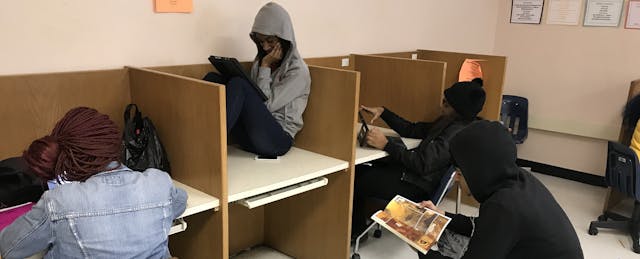Over the course of my career, I’ve had some years where my students’ standardized test scores were on the rise, and other years where they stagnated. Rarely did these scores correlate to the amount of growth each learner had experienced during our time working together.
One thing I know to be true is that little things matter a lot when it comes to recognizing student growth.
It matters when a student with trust issues lets you in and and opens up emotionally, or when a student starts showing up to class and gains enough confidence to start setting goals and advocating for himself. It counts when an essay expands from one unclear sentence to three paragraphs of compelling narrative, even if three paragraphs doesn’t cut it on the rubric.
While educators are engaged in long-winded conversations about how these tests don’t accurately reflect student success, kids are losing out every day. Some of the progress they are making is overlooked because it doesn’t fit into the box that has been designed for us. We need less empty rhetoric and more actionable steps and support to make change.
So what can growth look like for a student who isn’t having success on traditional measures? Like most things in education, it’s different for every learner, which makes it complex to capture on a case-by-case basis, let alone at scale. But each day my desire to find a way to recognize and celebrate all of the ways my students are growing feels more urgent.
If I don’t show my students how much I value their dedication to bettering themselves, then I’m not the teacher they need.
Take Junior for example (name has been changed), who I taught for 11th and 12th grade literature. To put it bluntly, he was on a pretty self-destructive path when we first met. It was January 2017 and he had come to McClarin Success Academy after failing multiple classes repeatedly at his previous school. He was supposed to graduate that May, but was expelled for disciplinary reasons a few months after starting with us. Junior was allowed to re-enroll in the fall and finish his credits.
His scores on the Georgia Milestones, our state standardized assessment system, haven’t improved much from one semester to the next, but he has made some pretty radical changes and today, he is finally on track to graduate in May 2018. Was he ultimately successful? It depends how you measure success.
Emotional Readiness
Our first semester together was hard for both of us. We often butted heads and disagreed on almost everything. I tried desperately to motivate him to do his classwork but he refused and always had an excuse: he was tired, his computer wasn’t working or he just wasn’t in the mood.
We had a lot of conversations in the hallway, which is about as private as it gets in a public high school, but none of our chats led him to put his best foot forward. Junior began warning me: “You don’t know who you’re messing with.” I always tried to get in the last word, which in hindsight, I’m certain was a mistake. Then we’d return to the classroom and he would check out again. This became a predictable cycle until one day he just stopped coming to school. That’s when I found out he had gotten into some trouble and had been expelled.
It’s hard for me to admit, but at the time I thought, “Good, if he isn’t here I can focus my energy elsewhere.”
Yet, I spent a lot of time thinking about Junior. Where was he? Was he okay? Could I have done anything differently to make him show up?
Spring ended and one morning at the start of fall, I walked into class to find Junior sitting in his chair. He had returned and this time things were different.
He overheard some students talking about my background as a professional fighter, and he made it a point to show me a video of him lifting weights. Suddenly we shared common ground. I told him weight training could be a positive outlet and that sparked some enthusiasm. He seemed genuinely grateful to have an advocate when he thought all bridges had been burned.
He asked me if I thought he could have a possible future as a firefighter. It was the first time I had seen him dream. I told him that was very much in reach.
It wasn’t all sunshine and flowers. There were moments of confrontation. At times, I questioned his commitment and wondered whether our relationship was falling into old patterns and would become a repeat of the prior year, but there was a pivotal moment when he came into school and did something he never had done before. He looked me straight in the eye and apologized for his behavior. “I was wrong. I just want to get back on track and graduate from high school.”
This is where we needed to be to get beyond foundational relationship-building to make academic progress. Junior needed to want to be there, and he had some emotional hurdles to jump over before he could return to school ready to learn and willing to vocalize it.
Changing Course
Emotional readiness was key for Junior, but that wasn’t his only challenge. His low level of engagement stemmed from his struggle with attention and his lack of confidence.
Junior was constantly distracted by his phone, by other students in the class or with his home life. His insecurities led him to believe that he couldn’t do his work well. If I didn’t build up his sense of self-worth so he could communicate his needs and advocate for himself, we were never going to get anywhere.
The second time around, I knew I needed to change my priorities.
We had a conference at the beginning of the semester to develop a shared set of expectations and for Junior to make some choices about what he wanted to learn and how to learn it.
Junior had a history of shutting down when overwhelmed, so I listened to him closely in an effort to figure out how to redesign the course so he could visualize the outcome, rather than just see an endless supply of assignments to complete.
I wanted to empower him to find his voice, so we came to the decision together to strip away the traditional in-class readings and extended response questions. The curriculum was filled with texts that Junior couldn’t connect to and the writing prompts asked him to provide detailed evidence from those texts, which he was unable to do at the time. He needed meaningful readings and writing prompts that allowed him to use writing as a mechanism for self-expression.
I started pulling excerpts from texts that would resonate with Junior like “The Autobiography of Malcolm X” so he could engage in a higher level of analysis, and we focused on basic writing skills through personal narrative until he felt confident enough to move on to other forms of writing.
Academic Effort
When Junior first came to McClarin, he would rarely submit more than a first sentence when asked to write an essay.

It wasn’t due to a lack of intelligence or an inability to decode or comprehend texts. Just a few weeks before he took this diagnostic writing test, his Lexile score was assessed and his level was 1100 (the low end of high school equivalency). Junior wasn’t engaged and he didn’t believe he could write.
Since our conference, I had been redesigning his assignments. Building confidence was a priority so we sat and worked together often. We dove into essay writing, starting with personal narrative because it allowed him to tap into his own experience and free himself from the limits and expectations of some other forms of writing.
Daily he would ask me to look at his work, and I would provide him with feedback and encouragement. Even though his constant desire for feedback teetered on obsessive, I encouraged the behavior so he wouldn’t fall back into old habits. Balanced feedback motivated him and he started to put in more effort.
In November 2017, I gave Junior a stripped-down version of the writing diagnostic to practice with. I asked him to choose an important milestone in his life and write a narrative essay about it. Junior said he had none and that he had hit rock bottom, so that's what we wrote about.

Was this essay going to get him a high score on the Georgia Milestones? Probably not. But look at it—I mean, really look at it. His effort was much higher, his voice and word choice had strengthened and his sentence flow and grammar had improved. Strip all of the writing skills away, and you can catch a glimpse of how he has grown as a person in his confidence, his ability to self-reflect on some of his flaws and his dedication to bettering himself as a human being.
Junior has completed all of his ELA coursework, and now he is focusing on math and science to complete his graduation requirements. He is scheduled to graduate in May, and we are planning to sit down with one of my firefighter friends before then so he can figure out his career options.
Junior’s road was never easy. Gauging his success using traditional measures would have crushed him completely, so I certainly don’t regret going to great depths to understand the root of his challenges so I could help him find his motivation. I only wish I didn’t need to go rogue and redesign curriculum under the radar. I hope that down the road there is a systemic shift towards capturing growth for students like Junior so that teachers like me feel supported and have the tools we need to help our students grow.
The student’s name was changed for this story.


